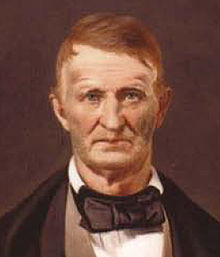Isaac Newton Blackford
| Isaac Blackford | |
|---|---|

Isaac Blackford from Who-When-What Book, 1900
|
|
| Clerk of the Indiana Territory House of Representatives | |
|
In office 1813–1814 |
|
| Judge of 1st Circuit of the Indiana Territory | |
|
In office 1814–1815 |
|
| Speaker of the Indiana House of Representatives | |
|
In office December 16, 1816 – December 19, 1817 |
|
| Constituency | Knox County |
| 2nd Indiana Supreme Court Chief Justice | |
|
In office September 10, 1817 – January 3, 1853 |
|
| Preceded by | John Johnson |
| Succeeded by | Andrew Davison |
| United States Court of Claims | |
|
In office March 3, 1855 – December 31, 1859 |
|
| Personal details | |
| Born | November 6, 1786 Bound Brook, Somerset County, New Jersey |
| Died | December 31, 1859 (aged 73) Washington, D.C. |
| Resting place | Crown Hill Cemetery |
| Political party |
Democratic-Republican Whig |
| Spouse(s) | Caroline MacDonald |
| Children | George Blackford |
| Residence | Indiana Governor's Mansion in Indianapolis, Indiana |
| Alma mater | Princeton University |
Isaac Newton Blackford (November 6, 1786 – December 31, 1859) was the second Chief Justice of the Indiana Supreme Court, the court's longest serving Justice, and among the longest serving jurists in the history of the United States. He wrote an eight-volume work entitled Blackford's Reports recording all the early decisions of the court. The books became a staple legal source among Indiana’s lawyers and received national and international acclaim for its style, accuracy, quality, and concision in dealing with common law. As a jurist, Blackford was the most influential ever to serve on Indiana's courts, according to former Chief Justice of Indiana Randall Shepard. He was nicknamed the "Indiana Blackstone" because of a comment made by Washington Irving regarding the popularity of Blackford’s books. During his lifetime he was nationally renowned as one of the most prominent jurists in the United States.
After graduating from Princeton University, Blackford moved to the Indiana Territory to practice law in 1812. After holding several civil service positions, he was appointed a circuit court judge but resigned just before the territorial government was dissolved in 1816. Elected as a representative to the first session of the Indiana General Assembly, he was chosen to serve as the first Speaker of the Indiana House of Representatives. Following the death of Indiana Chief Justice John Johnson in 1817, Blackford was appointed as his replacement by Governor of Indiana Jonathan Jennings. Blackford’s early important cases included Polly v. Lasselle, the decision in that case freed all slaves in Indiana. Nominated without his knowledge or permission, in 1825 he was the Whig candidate for Governor of Indiana, but was defeated in the election because of his refusal to campaign publicly. Again nominated without his knowledge to become a United States Senator, he lost the election in the Indiana General Assembly by only one vote.
...
Wikipedia
